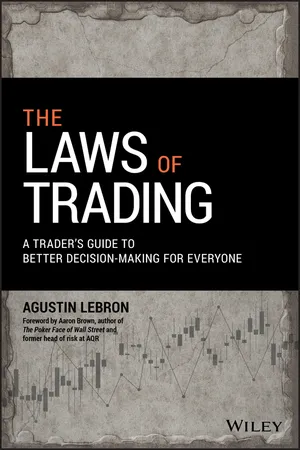
The Laws of Trading
A Trader's Guide to Better Decision-Making for Everyone
- English
- ePUB (mobile friendly)
- Available on iOS & Android
About this book
Every decision is a trade. Learn to think about the ones you should do — and the ones you shouldn't.
Trading books generally break down into two categories: the ones which claim to teach you how to make money trading, and the memoir-style books recounting scandals and bad behavior. But the former don't have profitable trades to teach; if they did they'd keep those trades to themselves. And the latter are frequently entertaining, but they don't leave you with much you can apply in your own life. The Laws of Trading is different.
All of our relationships and decisions involve trading at some level. This is a book aboutdecision-making through the lens of a professional prop trader. For years, behavioral and cognitive scientists have shown us how human decision-making is flawed and biased. But how do you learn to avoid these problems in day-to-day decisions where you have to react in real-time?What are the important things to think about and to act on? The world needs a book by a prop trader who has lived, breathed and taught trading for a living, drawing upon years of insights on the trading floor in real markets, good and bad, whether going sideways, crashing, or bubbling over. If you can master the decision-making skills needed to profitably trade in modern markets, you can master decision-making in all walks of life. This book will teach you exactly those skills.
- Introduces, develops, and applies one law per chapter, making it easy not only to remember useful concepts, but also to have them at the ready in any situation.
- Shows you how to find and think about the "special edge" of your organization, and yourself.
- Teaches you how to handle the interaction of people with artificially intelligent (AI) machines that make decisions, a skill that is rapidly becoming essential in the AI-driven economy of the future.
- Includes a "bonus" digital ancillary, anExcel spreadsheet with various worked examples that expand on the scenarios described in the book.
Do you need to make rational decisions in a competitive environment? Almost everyone does. This book will teach you the tools that let you do your job better.
Frequently asked questions
- Essential is ideal for learners and professionals who enjoy exploring a wide range of subjects. Access the Essential Library with 800,000+ trusted titles and best-sellers across business, personal growth, and the humanities. Includes unlimited reading time and Standard Read Aloud voice.
- Complete: Perfect for advanced learners and researchers needing full, unrestricted access. Unlock 1.4M+ books across hundreds of subjects, including academic and specialized titles. The Complete Plan also includes advanced features like Premium Read Aloud and Research Assistant.
Please note we cannot support devices running on iOS 13 and Android 7 or earlier. Learn more about using the app.
Information
CHAPTER 1
Motivation
Why Are You Trading?
| Rachel: | “Going to pick up some things at the supermarket. Want anything? How are things going by the way?” |
| David: | “Good, earnings season is heating up. Got a good feeling about some of these picks I've made.” |
| Rachel: | “How have you been doing so far this earnings season?” |
| David: | “I made a couple of good calls yesterday. Decent. Nothing like that awesome streak from last year, but pretty good.” |
| Rachel: | “So you're making money?” |
| David: | “Look, there's a lot of variance so it's hard to say for sure. What I do know is that when I get in the zone, like I did those couple of weeks a year ago, I make all the correct calls. It's like Neo from the Matrix.” |
| Rachel: | “Neo traded options?” |
| David: | “No he didn't. But when he got in the groove, time slowed down and he couldn't miss. That's how it feels when you're trading and you're feeling it. Like you almost can't lose.” |
| Rachel: | “Can't lose? I thought there was a lot of variance.” |
| David: | “Ah, you just don't get trading…” |
Shouldn't This Chapter Be Short?
- We underestimate small probabilities sometimes (the chance of getting hung up in traffic and arriving late to an appointment) and overestimate them other times (the chance of dying in a plane crash).
- We consistently overestimate our knowledge (a cognitive blind spot known as the Dunning-Kruger effect) and abilities (well over half of surveyed people think they're better-than-average drivers).
- When suitably framed, we consistently say that A and B occurring is somehow more likely than A only occurring. When we do this, we're violating a basic principle of logic without even noticing it.3
Greed and Fear
Boredom
Table of contents
- Cover
- Table of Contents
- Acknowledgments
- Foreword by Aaron Brown
- Introduction
- CHAPTER 1: Motivation
- CHAPTER 2: Adverse Selection
- CHAPTER 3: Risk
- CHAPTER 4: Liquidity
- CHAPTER 5: Edge
- CHAPTER 6: Models
- CHAPTER 7: Costs and Capacity
- CHAPTER 8: Possibility
- CHAPTER 9: Alignment
- CHAPTER 10: Technology
- CHAPTER 11: Adaptation
- Index
- End User License Agreement